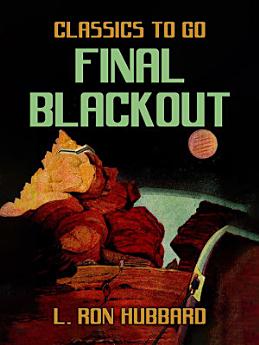Final Blackout
Oct 2022 · Otbebookpublishing
Ebook
122
Pages
family_home
Eligible
info
reportRatings and reviews aren’t verified Learn More
About this ebook
Final Blackout is a dystopic science fiction novel by American writer L. Ron Hubbard. The novel is set in the future and follows a man known as "the Lieutenant" as he restores order to England after a world war. A lieutenant (known in the book only as "The Lieutenant") becomes dictator of England after a world war. The Lieutenant leads a ragtag army fighting for survival in a Europe ravaged by 30 years of atomic, biological and conventional warfare.
About the author
L. Ron Hubbard (1911-1986) was an American author and the founder of the Church of Scientology, whose life and work continue to spark both admiration and controversy. Born in Tilden, Nebraska, Hubbard's early years were marked by a voracious appetite for adventure and knowledge, which led him to travel extensively and immerse himself in various cultures. This eclectic background fueled his prolific writing career, spanning genres from science fiction and fantasy to self-help and religious texts.Hubbard's literary contributions are vast, with over 1,000 published works, including short stories, novels, and essays. His science fiction works, particularly those published in the pulp magazines of the 1930s and 1940s, have left a lasting impact on the genre, influencing contemporary writers with their imaginative scope and narrative daring. Titles like "Battlefield Earth" and the "Mission Earth" series are notable for their epic storytelling and complex world-building.However, Hubbard's legacy is not without its controversies. The establishment of Scientology in the early 1950s, based on his book "Dianetics: The Modern Science of Mental Health," has been both revolutionary and polarizing. Critics have questioned the practices and financial operations of the Church, while followers praise its teachings for personal transformation.Hubbard's life story, marked by bold ventures and contentious episodes, continues to captivate modern readers. His influence extends beyond literature into the realms of psychology, religion, and popular culture, making him a figure of enduring fascination and debate.
Rate this ebook
Tell us what you think.
Reading information
Smartphones and tablets
Install the Google Play Books app for Android and iPad/iPhone. It syncs automatically with your account and allows you to read online or offline wherever you are.
Laptops and computers
You can listen to audiobooks purchased on Google Play using your computer's web browser.
eReaders and other devices
To read on e-ink devices like Kobo eReaders, you'll need to download a file and transfer it to your device. Follow the detailed Help Center instructions to transfer the files to supported eReaders.








